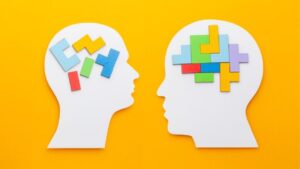Attention Deficit Hyperactivity Disorder (ADHD) is often associated with hyperactive children bouncing off the walls and struggling to concentrate in school. However, the reality is that ADHD doesn’t magically disappear with age. Many individuals continue to grapple with its challenges into adulthood. In this blog, we’ll explore the intricacies of adult ADHD, shedding light on its symptoms, impact on daily life, and strategies for managing this often misunderstood condition.
Understanding Adult ADHD:
1 The Evolution of ADHD:
ADHD is a neurodevelopmental disorder that affects both children and adults. While some individuals may receive a diagnosis during childhood, others may only recognize their ADHD symptoms later in life. It’s crucial to understand that ADHD is a lifelong condition with symptoms that can manifest differently across various stages of life.
2 Common Symptoms in Adults:
Adult ADHD presents a unique set of challenges. While hyperactivity might decrease with age, the core symptoms persist. Adults with ADHD often struggle with organization, time management, and maintaining focus on tasks. Impulsivity can lead to difficulties in decision-making and navigating social situations.

The Impact of Adult ADHD:
1 Workplace Challenges:
Holding down a job can be particularly challenging for adults with ADHD. Difficulties with time management, forgetfulness, and impulsivity can lead to performance issues and strained relationships with colleagues. Understanding the impact of ADHD on the workplace is crucial for both individuals with ADHD and their employers.
2 Relationship Struggles:
The impact of ADHD extends beyond the workplace and into personal relationships. The impulsivity and distractibility associated with the condition can strain partnerships and friendships. Communication breakdowns and feelings of frustration are common challenges faced by adults with ADHD and their loved ones.

Managing Adult ADHD:
1 Medication and Therapy:
Medication, such as stimulants and non-stimulants, is a common treatment option for adult ADHD. These medications can help regulate neurotransmitters in the brain, improving focus and impulse control. Additionally, therapy, such as cognitive-behavioral therapy (CBT), can provide valuable coping strategies and support.
2 Lifestyle Modifications:
Beyond medication and therapy, lifestyle modifications play a crucial role in managing adult ADHD. Establishing routines, setting reminders, and creating an organized environment can significantly improve daily functioning. Regular exercise and a healthy diet are also linked to better symptom management.

3 Mindfulness and Meditation:
Mindfulness practices, such as meditation and yoga, can be powerful tools for adults with ADHD. These techniques help cultivate self-awareness and enhance the ability to stay present, reducing the impact of distractions and improving overall mental well-being.
4 Support Groups:
Joining a support group for adults with ADHD provides a sense of community and understanding. Sharing experiences and strategies with others facing similar challenges can be empowering and reduce feelings of isolation.

Overcoming Stigma:
1 Dispelling Myths:
Stigma surrounding ADHD persists, fueled by misconceptions and stereotypes. Dispelling myths about the disorder is essential for creating a more inclusive and empathetic society. ADHD is not a lack of intelligence or discipline but rather a neurobiological condition that requires understanding and support.
2 Advocacy and Awareness:
Advocacy efforts and raising awareness about adult ADHD are crucial for creating a more inclusive environment. This includes educating workplaces, schools, and communities about the challenges faced by individuals with ADHD and fostering an environment of acceptance.

Looking to the Future:
1 Research and Innovation:
Ongoing research into the neurobiology of ADHD and innovative treatment approaches offer hope for the future. Increased understanding of the genetic and environmental factors contributing to ADHD can pave the way for more targeted interventions and personalized treatment plans.
2 Education and Early Intervention:
Early diagnosis and intervention for children with ADHD can significantly impact their trajectory into adulthood. Increased awareness and education about ADHD in schools can help identify and support individuals early on, minimizing the long-term impact of the disorder.

Conclusion:
Adult ADHD is a multifaceted challenge that requires a comprehensive and compassionate approach. By understanding the symptoms, acknowledging the impact on various aspects of life, and embracing diverse strategies for management, individuals with ADHD can lead fulfilling and successful lives. It’s time to break the stigma, foster understanding, and work towards a society that recognizes and supports the unique strengths and challenges of those with adult ADHD.





